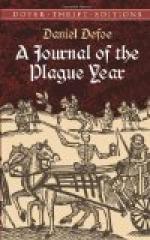INTRODUCTION.
The father of Daniel Defoe was a butcher in the parish of St. Giles’s, Cripplegate, London. In this parish, probably, Daniel Defoe was born in 1661, the year after the restoration of Charles ii. The boy’s parents wished him to become a dissenting minister, and so intrusted his education to a Mr. Morton who kept an academy for the training of nonconformist divines. How long Defoe staid at this school is not known. He seems to think himself that he staid there long enough to become a good scholar; for he declares that the pupils were “made masters of the English tongue, and more of them excelled in that particular than of any school at that time.” If this statement be true, we can only say that the other schools must have been very bad indeed. Defoe never acquired a really good style, and can in no true sense be called a “master of the English tongue.”
Nature had gifted Defoe with untiring energy, a keen taste for public affairs, and a special aptitude for chicanery and intrigue. These were not qualities likely to advance him in the ministry, and he wisely refused to adopt that profession. With a young man’s love for adventure and a dissenter’s hatred for Roman Catholicism, he took part in the Duke of Monmouth’s rebellion (1685) against James ii. More fortunate than three of his fellow students, who were executed for their share in this affair, Defoe escaped the hue and cry that followed the battle of Sedgemoor, and after some months’ concealment set up as a wholesale merchant in Cornhill. When James ii. was deposed in 1688, and the Protestant William of Orange elected to the English throne, Defoe hastened to give in his allegiance to the new dynasty. In 1691 he published his first pamphlet, “A New Discovery of an Old Intrigue, a Satire leveled at Treachery and Ambition.” This is written in miserable doggerel verse. That Defoe should have mistaken it for poetry, and should have prided himself upon it accordingly, is only a proof of how incompetent an author is to pass judgment upon what is good and what is bad in his own work.
In 1692 Defoe failed in business, probably from too much attention to politics, which were now beginning to engross more and more of his time and thoughts. His political attitude is clearly defined in the title of his next pamphlet, “The Englishman’s Choice and True Interest: in the Vigorous Prosecution of the War against France, and serving K. William and Q. Mary, and acknowledging their Right.” “K. William” was too astute a manager to neglect a writer who showed the capacity to become a dangerous opponent. Defoe was accordingly given the place of accountant to the commissioners of the glass duty (1694). From this time until William’s death (1702), he had no more loyal and active servant than Defoe. Innumerable pamphlets bear tribute to his devotion to the King and his policy,—pamphlets




